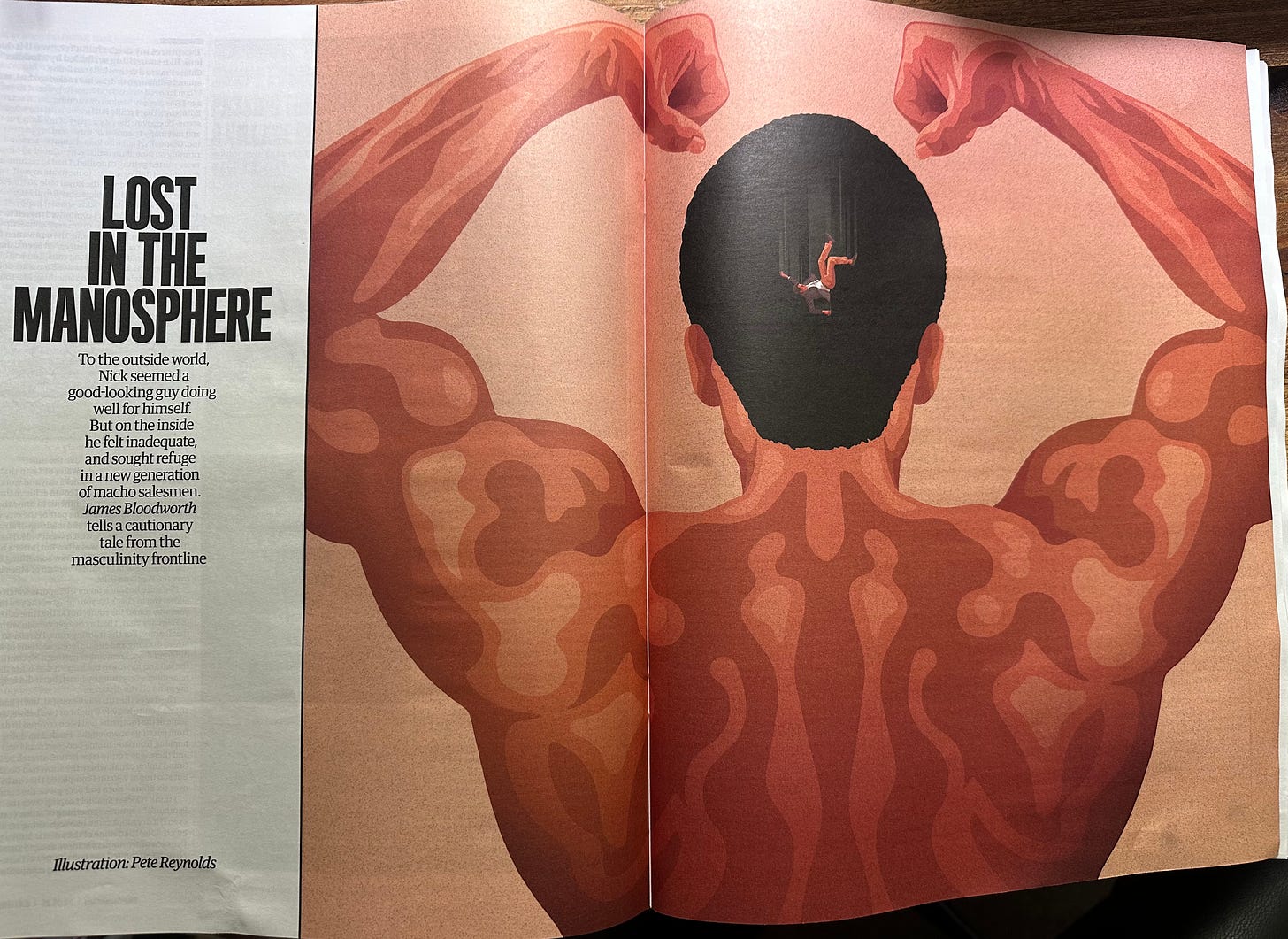How my friend fell for the red-pill hucksters of the manosphere
An excerpt from Lost Boys
The Guardian have been kind enough to publish a lengthy excerpt from my forthcoming book Lost Boys. The section in question centres around a young man named Nick whom I got to know during my investigation into the manosphere.
As well as Nick’s personal involvement in the manosphere, the piece deals with the impact social media (and the catalogue of flesh that constitute dating apps) has had on human relations. Or more specifically, the feelings of inadequacy generated by a digital landscape in which the yardstick by which people measure themselves has radically changed in a brief period of time - and how this can foster radicalisation into male supremacist communities.
When I first met Nick in 2019, at a dating and self-improvement summit in Miami, it wasn’t immediately obvious why he was paying so much money to pseudo-authority figures from the manosphere. He had looks, cash and some of the easy swagger of London done good.
Nick had been looking for a girlfriend when I had first met him in Miami. He had a whiteboard in his room with a “vision” on it for where he wanted his life to be in six months’ time. He was fully bought into the self-help dogma about building momentum and improving – always improving. He planned to drop down a few percentage points of body fat, listen to more audiobooks (always on 1.5x speed) and find a quality girl to spend time with on weekends: someone to go out to restaurants with or watch films with on a rainy day. When Nick told me about the vision board, his goals sounded achievable and I was tentatively in favour of them. However, a few months later he scrubbed out the third goal and wrote a new one in its place. This one was more ambitious; it also seemed to have been implanted in Nick’s head by someone else. Finding a girlfriend was no longer one of the objectives. Now he wanted a “rotation”: a micro-harem of women who would share him between themselves and never demand exclusivity. “Women would rather share an alpha than get with a beta,” he told me, ventriloquising some red-pill huckster I had definitely heard say the same thing.
The manosphere has long divided the world into rigid and distinct hierarchies. Women are rated on a scale from one to 10. Men apply a similar taxonomy of social rank to themselves and each other. There are alphas and betas; red-pilled and blue-pilled; high-status and low-status. With the advent of social media, the process of stratification intensified. Dating is increasingly depicted as a winner-takes-all world in which a small percentage of men at the very top take the spoils. The rest are surplus men, condemned to a life of onanistic obstinacy.
In one sense the manosphere reflects wider market logic, which continually pushes its tentacles into new areas of life. Instagram launched in 2010; 10 years later it was home to 1.4 billion users. For some of them, life would steadily become a series of monetisable content opportunities. For others, this and similar platforms fostered subjective feelings of pauperisation. Users were more keenly aware of what they didn’t have; who their competition was; and how they were failing to market themselves correctly as consumable brands. At around the same time, dating apps were injecting market logic into the intimate domains of love, sex and romance. The LGBTQ+ app Grindr went online in 2009, followed by Tinder in 2012. Other people were becoming two-dimensional objects, marketed to potential consumers via these digital catalogues of flesh.
In the manosphere, these technological developments helped to spur the emergence of two contrasting – and mutually antagonistic – communities. “Incels”, a shorthand for involuntary celibates, subscribe to an ideology they call the “black pill”. Followers of the black pill accept most tenets of the red pill. Sex and relationships are viewed as rigid and hierarchical. Women, whom they depict as shallow, deceitful and opportunistic, are said to be “programmed” by their biology to sort men into desirable alphas and repulsive betas. Men outside the community are viewed as “blue-pilled” and brainwashed. Intimate relationships take place within a “sexual marketplace” (SMP). “High-value” individuals have a greater sexual market value (SMV: exchange value) than “low-value” individuals.
If the blue pill is synonymous with ignorance and the red pill about understanding the matrix to manipulate it, the black pill is rooted in the decision to relinquish hope altogether. Incels see themselves as the unwanted detritus of successive sexual and social media revolutions. Refusing to compete with the torrent of perfect images, they stew in nihilism and despair, denied access to the main currency of masculinity: women’s bodies.
Nick wasn’t an incel; he was one of the men who saw incels as a cautionary tale – the ultimate destiny of anyone who failed to mould themselves to the dictates of the digitised sexual marketplace. These men subscribed to many of the same reductive theories as the incels. They knew all about “SMVs” and – in common with just about every other faction in the manosphere – they frequently made men and women sound like eBay collectibles. Yet they were status-maxxers. Instead of marinating in resentment on subterranean forums such as 4chan and Reddit, they were spending eye-watering sums of money in the hope of joining the digital sexual elite. And, inevitably, a new generation of masculinity salesmen were on hand, promising to make their dreams come true.
You can read the piece in full on the Guardian website. You can also pre-order the book here.



